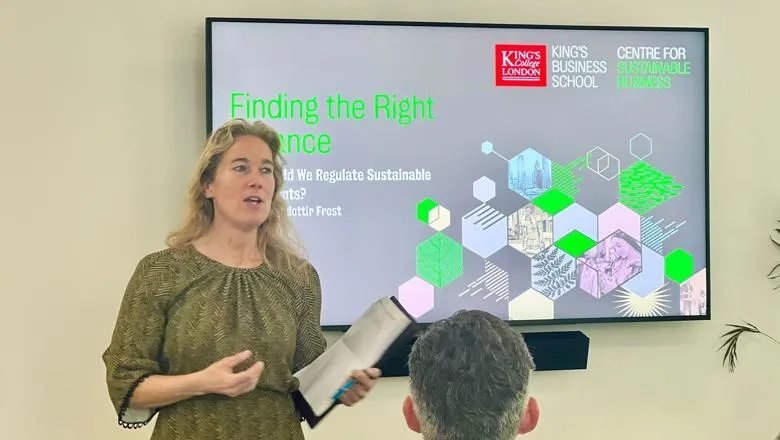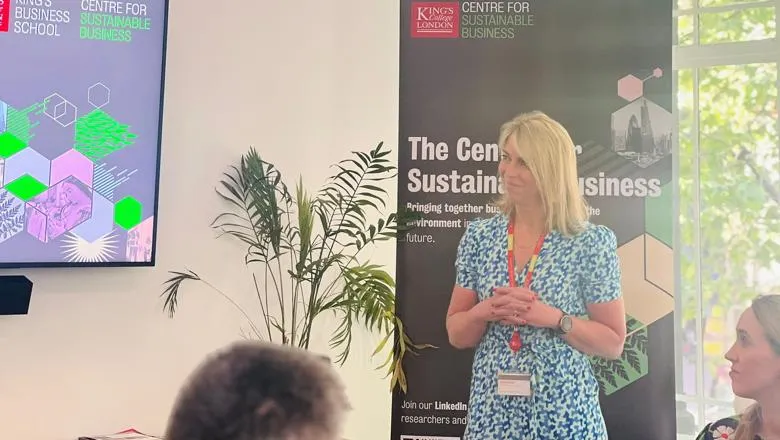19 June 2025
Insights from the inside: Navigating the future of sustainable investment regulation
By Thora Helgadottir Frost, PhD candidate
PhD candidate Thora Frost shares insider perspectives from a recent workshop with financial leaders on the future of sustainable investment regulation. As sustainable finance faces rising scrutiny, she explores why current UK and EU reforms may fall short – and what’s needed to support the market.

Sustainable investing is no longer a niche market. But as demand has grown, so too have concerns about greenwashing and whether these investments are genuinely aligned with real-world sustainability outcomes.
In response, regulators in the EU and the UK have introduced new sustainability disclosure and labelling regimes. While these efforts aim to increase transparency and build trust, critics argue that the rules may be too complex, too rigid – or too weak – to drive meaningful change.
With EU regulations under review, the UK’s Sustainable Disclosure Requirements (SDR) being rolled out, and an ESG backlash reshaping the regulatory conversation in the US, the debate is more relevant than ever.
In May, the Centre for Sustainable Business at King’s Business School hosted a roundtable on this topic. Asset managers, regulators, industry bodies, and academics contributed market insights to a much-needed discussion, helping to identify key elements of a robust and effective regulatory framework for sustainable finance.
Below are the key takeaways.

1. Financial regulation is necessary but insufficient
Participants concurred that regulation plays a vital role in ensuring market integrity, building trust, and protecting consumers, especially retail investors, following recent greenwashing scandals and the broader ESG backlash.
Participants also cautioned that regulatory ambition alone cannot deliver the scale of sustainable investment needed. Without real economic reforms, such as stronger climate policies, clear price signals, and targeted sectoral interventions, regulation risks overpromising and underdelivering.
2. Sustainability means different things to different investors
There was broad agreement about the need to recognise that sustainable investing is not a single concept, but a spectrum of approaches reflecting different investor motivations and objectives. For example, investors focused on physical climate risk may seek different opportunities than those aiming to finance the net-zero transition.
The role of regulators should be to provide transparency and clarity around these distinctions, rather than impose a single, rigid definition of sustainable finance. A one-size-fits-all approach risks obscuring these differences and undermining the usefulness of disclosures and labels.
Participants warned that poorly designed rules could have substantial unintended consequences, such as mispricing green risk, discouraging investment in hard-to-abate sectors, or fostering complacency through overly simplistic classification systems. A more practitioner-based approach can be more effective than an overly framework-based model.
3. Global standards for meaningful, materiality-based reporting
Participants stressed the need for more standardised disclosure reporting across corporate and financial institutions. For this, alignment with global frameworks like the ISSB (International Sustainability Standards Board) standards, while maintaining a principles-based, materiality-focused approach is essential.
Alignment could reduce reporting burdens and enable more meaningful comparisons, especially for global investors that navigate multiple regulatory regimes.

4. Transition plans as a bridge between finance and the real economy
Transition plans can be a practical tool that drives corporate accountability and link finance more closely to real-world decarbonisation. Rather than being sidelined in regulatory updates, transition plans are essential for navigating uncertainty and aligning investor engagement with long-term change.
Participants also highlighted their value as a platform for dialogue, encouraging companies, investors, and policymakers to move beyond headline targets and focus on assumptions, dependencies, and qualitative narratives.
5. The forgotten private market
Private markets were identified as a regulatory blind spot, with concerns about ‘brown-spinning’ (the movement of high-emitting assets into less transparent private vehicles). A solution in the UK could be to expand the UK SDR to address persistent information asymmetries. Conversely, overregulation, could deter investment flows. Ideally, proportionate and tailored oversight - especially in light of the extended Mansion House Accord and broader efforts to mobilise private capital for sustainability – can support sustainable finance in private markets.
6. Mobilising capital for the UK transition
Participants emphasised the need for the UK to develop new green industries and close the sustainability skills gap, with a clear role for government in supporting this through co-investment vehicles. Institutions such as GB Energy and the National Wealth Fund can be catalytic in mobilising private capital towards strategic national priorities. However, concerns were raised about the scale of the current UK skills gap, and realism about what can and should be achieved domestically.
Final thoughts
The roundtable emphasised that the question is not whether sustainable finance should be regulated, but how it can help deliver an effective market. Getting the design right will require a careful balance between transparency, flexibility, ambition, and realism
But financial regulation alone is not enough. To deliver a more sustainable economy, it must be backed by coherent real economy policies, fiscal incentives, and credible price signals. Without this foundation, sustainable investment risks falling short of its potential.
*
Thora Frost is a PhD student in Banking & Finance at King's Business School, affiliated with the Centre for Sustainable Business (CSB). Her research focuses on sustainable investment, with a particular interest in the effectiveness of sustainable finance regulations and labels on investment funds to facilitate sustainable capital flows and mitigate greenwashing.

